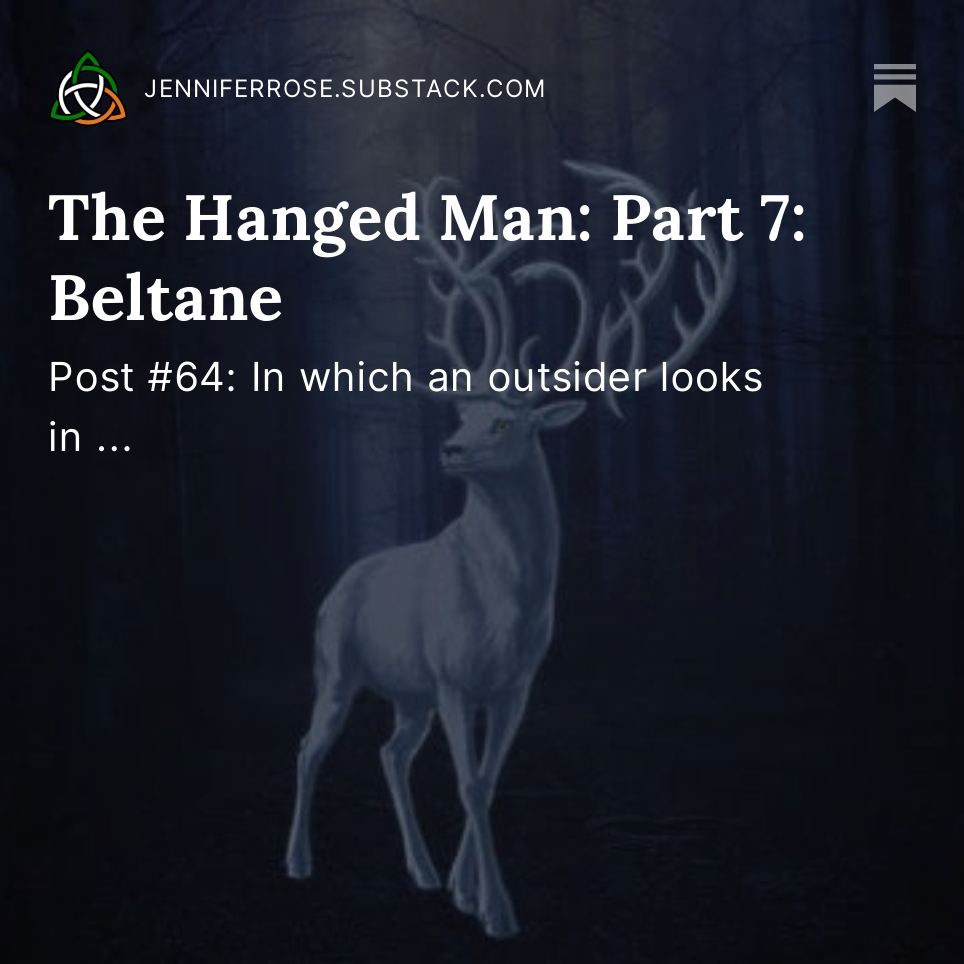by Jenny Rose | Oct 7, 2023 | A Flourishing Woman, The Journey
This post grew out of two seeds. The first was a piece by a substacker I follow who heard a phrase on a podcast about pleasure in discipline. It struck her that she’s good at finding pleasure in discipline (think productivity), not so good at being disciplined about pleasure.
This struck me, too. I’m quite disciplined when it comes to achieving goals and being productive, but it never occurs to me to apply that same discipline to pleasure. What a thought! How lazy. How irresponsible …

By Veljo Milic on Unsplash
Amused at my internal horror, I played with this idea for a day or two. Discipline is like a doorway, I mused. One can walk through it and into pleasure. Being a strong adherent of Work Before Pleasure (even though I know the work never ends), the doorway metaphor seemed appropriate. For a minute. Until I realized standing in the doorway of discipline, unable to move forward into pleasure, is no good, either. And that’s mostly what I do.
Sigh.
Then, I did my Mabon Tarot spread. I do this at every turn of the wheel. Mabon is Fall Equinox. It came and went while I was wading through paperwork, documents, emails, insurance, retirement investments, and the business of changing banks, cards, automatic payments, and transfer networks.
Did I mention paperwork?
Anyway, I did eventually get to pulling cards about a week after Mabon. The last card of the spread, the “overall outcome” card, happened to be the 9 of Stones (my deck), or the 9 of Pentacles (classic deck). In my deck, this card is the card of tradition, signifying reverence for past wisdom and sacrifice, and ancestral memory.
It stopped me in my tracks. Ever since my mother died in August (hence the endless paperwork), I’ve been preoccupied with family, past and present, living and dead, known and (mostly) unknown. Managing my inheritance has been fraught with guilt, shame, anguished memories, bewildered pain.
I don’t feel reverence. Whatever I feel, it’s not that. (Another thing to feel guilty about.) Whatever happened in my past context of family, I’ve found no wisdom in it. Plenty of sacrifice, though, mostly of and by me.
In the five days since I turned this card over, I’ve been thinking about it. It’s the traditional time of year for many cultures to remember ancestors, the time when the veil between the worlds grows thin, the time when the trees release their leaves to decay and sleep before the next season of growth.
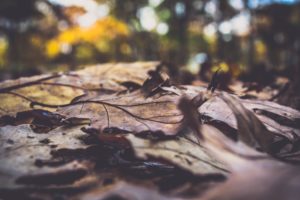
Photo by fancycrave on Unsplash
The discipline of pleasure. And the pleasure of discipline.
Reverence for past wisdom and sacrifice; ancestral memory.
I suddenly remembered an old story I used to tell during this time of year, “The Corpse Bride.” It’s a story out of Jewish tradition. A corpse bride, still wearing her wedding finery, mourns her violent death as she was on her way to her wedding. She grieves for her lost opportunities. A living bride comforts her, vowing to fully experience all that the corpse bride dreamed of and lost. The corpse bride is then able to lie back in her grave and rest in peace.
These pieces seemed to answer a question I haven’t consciously asked. Discipline. Pleasure. Unquiet ancestors. Lost opportunities.
How do we connect with our ancestors in a healthy way? We’re only just beginning to understand epigenetics and the ways in which we’re linked to the generations who came before us. I know something about my DNA, but almost nothing about ancestors. When I think of ancestors, I think of a dignified group of people, wise, healthy, connected, at peace. When I think of my family, I think of rejection, dysfunction, and abandonment. I hardly knew my family, even the ones living during my lifetime. What I mostly knew was I didn’t belong, though I was a biological child of the people I called Mom and Dad.
I feel no connection to ancestors. My unconscious assumption is they wouldn’t want me any more than the family I knew did.
However. The fact is I do have blood ties and a biological family tree, as we all do. I have inherited certain characteristics, behaviors, weaknesses, strengths, and wounds through epigenetics as well as genetics and environmental factors. I am now a twig at the end of a branch on the family tree. Neither of my sons have children. I have no daughter. My two cousins are also childless, as is my brother. I am the last female in the last generation of my direct maternal line.
Me. The highly sensitive, passionate, sensual, creative, noncompliant one nobody wanted!
I dealt several Tarot cards of healing and recovery in that Mabon spread. Perhaps they’re not solely about my healing. In conjunction with the season and this powerful card of ancestry, perhaps I have an opportunity to heal myself and comfort? give peace to? palliate? propitiate? the women who came before me, the women who gave me life.
Whatever came before, I’m here now. I breathe. My heart beats. Half the family resources are in my hands. I have the power to make choices. I choose to continue forward into generosity, healing, and joy. I don’t have ancestral traditions or maps. No one ever gave me a map, because they didn’t know the way themselves. Maybe they didn’t want to go in that direction; maybe they stopped looking for the path. It doesn’t matter now.
What matters now is to live … because they can’t. Like the corpse bride, their earthly opportunities are lost. Maybe from the very beginning I was the one with the potential to bring my female ancestors peace at last, not because I complied with their oppression, but because I refused it. Maybe it’s my wisdom that’s needed, the map in my pocket we all must follow.
The women of my family taught me some of the pleasures of discipline. Perhaps I must teach them about the discipline of pleasure, of joy. Which means I must learn it myself first.
I swam yesterday. I’m required to train weekly for my lifeguard position, but that’s only a good excuse. I swim for pure pleasure. I relished every sensual detail, every rhythmic breath, every stretch and flex of my muscles, the silk of the water. I relished the hot shower afterwards, the long drink of water I took, my clean hair and warm and relaxed body. Because they never did, even when alive. Because they never can.
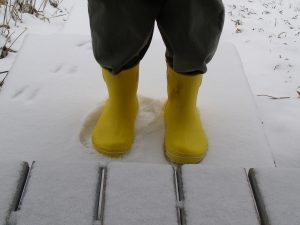
Yellow Boots
This Saturday morning I ran to the store. I took a deep lungful of the grey, humid air, heavy with the promise of coming rain. I savored it. I chatted with the cashier. I bought myself a luxurious dark chocolate bar. I deliberately splashed through a puddle in the parking lot with my bright yellow duckie boots. I smiled at strangers. I drove home with the window open and the damp air stirring my hair. Because they never did these things. (Well, maybe the chocolate. Mom did like chocolate.) Because now they never can.
I sit here on my couch with the cats, the laptop on my lap. I’m burning a scented candle, surrounded by a couple of sleeveless summer shirts I just bought on sale, my journal, lists, notes, the mail. I’m at peace. I don’t have pain. (Mom always had pain.) I’m content. I have friends I love and who love me. Life is good, filled with projects and plans. In a few minutes I’ll get up, put some laundry in, wash the dishes, stand in the doorway and look at the sky, feel the air stirring as the storm approaches. I won’t do these things because I’m disciplined and productive, or because I must, but because I can. I want to. I choose to. These are the small tasks of my life, and I love my life.
All these I’ll do for myself, and also for them, my ancestors, the women who came before me, my blood, my bone, the wombs who gave me life. Because they can’t.
They’re gone. (May they rest in peace.)
But I’m still here.
Questions:
- What does the word ‘ancestor’ mean to you? Do you connect it with a real person in your life?
- Are you prepared to be an ancestor? What wisdom would you pass on to younger generations?
- Do you feel connected to the generations of family before you?
- Would you like to be more deeply connected to living family members? What’s in your way?
Leave a comment below!
To read my fiction, serially published free every week, go here: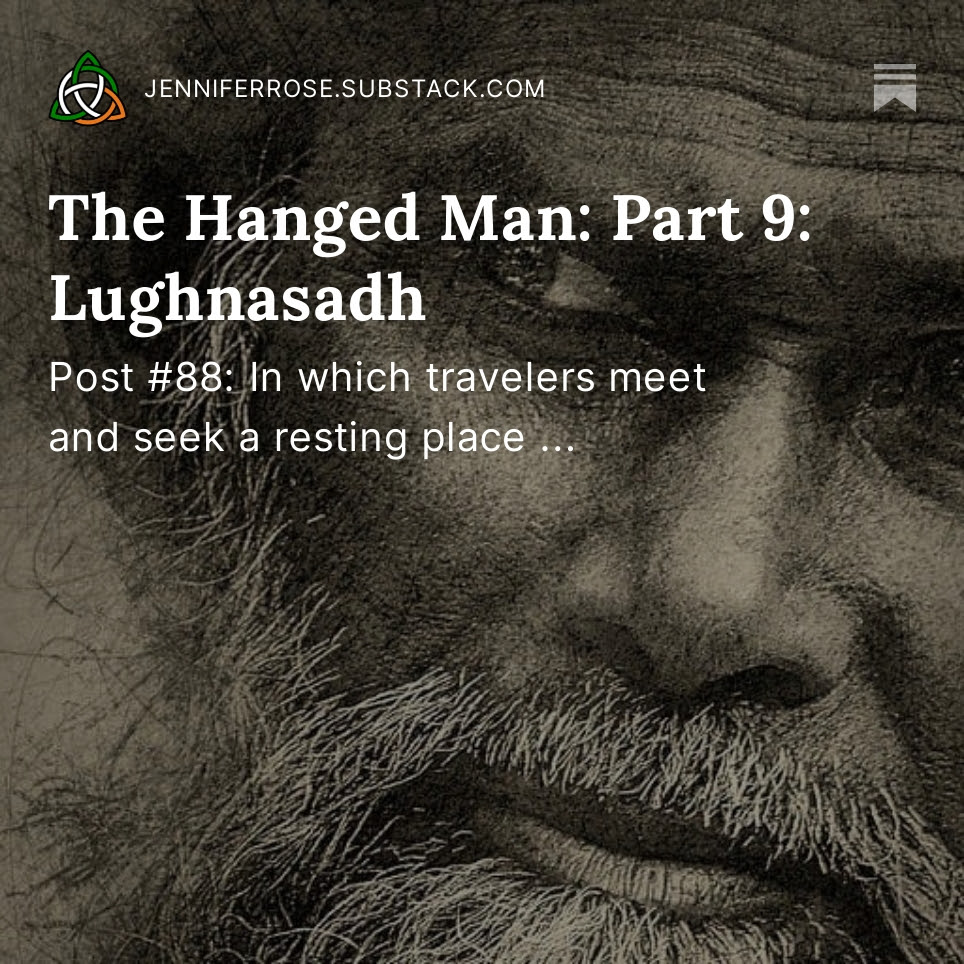
by Jenny Rose | Sep 23, 2023 | A Flourishing Woman, The Journey
Today is Mabon. My calendar informs me it’s my weekend to post on Harvesting Stones. Some weeks I’m all ready to go and need do nothing more than push the publish button. This week these are the first words I’ve written, sitting here on my little porch on Saturday morning watching the clouds tatter before the morning sun.
Mabon, or fall equinox, is the balance point during which the hours of daylight and darkness are equal. It mirrors spring equinox and falls between winter and summer solstice. Fall is my favorite time of year, and this fall I’m in the midst of profound transformation. It’s a harvest season like no other in my life.
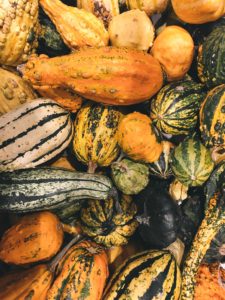
Photo by Brigitte Tohm on Unsplash
Sometimes we are so swept up in the tides of life and death we can do nothing but keep breathing. Days fall away from me, hours drift by and disappear without my awareness. I am focused on the next task, and the next. At the end of each day, I cross to-dos, questions, concerns off my lists, make notes for the next days and weeks, and fall into bed before rising at 4:30 or 5:00 to begin again.
In the midst of the chaos, I remember I choose my life. I’m getting better at just stopping.
Stopping.
I have before me a weekend. Mabon, 2023. It will never come again. A hundred tasks to do. A hundred things to worry about. A hundred choices to make.
Mabon is about balance. Action balanced with rest. Complexity balanced with simplicity. Fear balanced with confidence. Work balanced with play. Grief balanced with joy.
The light; the growing season; the summer of hospice, anguished love, extra caregivers, demented phone calls, medication lists, and, finally, my mother’s death, wane. Trees retain their leaves, but summer’s fierce green fades, bronzing, drying. Sedum and chrysanthemums bloom in the garden. A few sunflowers still flower among the ripening seed heads of their fellows.
Mabon. Balance. And I, a creature, a life among so many other lives, what can I say about it? How can I talk about balance when it feels so far from reach? How will I find balance again on the other side of transformation?
What I hold are impressions, vivid moments of mindfulness and sensuality, unexpected emotions, and the determination to cling fast to myself as autumn rip tides carry me where they will. For I am here, alive, curious, creative, awed, grateful, terrified.
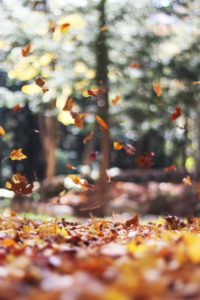
Photo by Autumn Mott on Unsplash
I’m rereading Susan Fletcher, a favorite author. I just finished Oystercatchers. On the last page, this: “You’re this: an onion bulb. The glint of a rabbit’s eye. The clicking of a beetle’s legs on a leaf; the leaf’s brown edge; dandelions; a pebble; windfall fruit.”
I read no more; I was crying too hard.
My mother is always with me. She has always been with me. My blood, my bone, my sculptor. Now, her death is with me, too, and her dying. Grief has not come to the front door, which I’ve left ajar in anticipation of its coming. It’s crawled through cracked windows, slipped through old screens long-dead cats tore with their claws. It’s drifted down the chimney, come up through gaps in my old wood floor from the cellar, crept along the copper radiator pipes, cool now, but soon to be warming.
I carry bewildered pain within me, like a ripe nut in its shell. How does it happen that a human being, intelligent, talented, competent, with so much to give, can have no feel for life? How can anyone refuse to engage with the mystery, the glory, the terror, the sweetness, and yes, even the pain of what it means to be alive, to love, to be broken and heal over and over?
Isn’t it strange that I find her in the small delights she herself would never have recognized as sustenance, as miracles? Something in Mom was too blind or too broken or perhaps too frightened to allow life to clasp her in its arms. Something. We could never talk about it. I knew it was there, but she would not reveal even the edges of her true experience.
In the end, as the fogs of dementia surrounded her, she was at last able to say she loved me. I have that, at least. And yet, she was demented … But I choose to believe.
Mabon, then, is the autumn garden. Planting blue and white grape hyacinths in drifts with daffodils under the magnolia so in spring they will bloom and naturalize as the seasons come and go. Shoveling and spreading compost mixed with aged cow manure, rich with earthworms and beetles. Pruning, trimming, prying weeds and grass out of cracks in the sidewalk and driveway. Disturbing our small brown toads as I weed and clean up debris in readiness for the blanketing fallen leaves. Dividing and transplanting. Spider webs jeweled with dew. Chilly mornings and gorgeous afternoons. The smell of my catnip, ecstatically trampled and chewed, no doubt discovered by the neighborhood black cat, Winston by name. Planting a few end-of-season sale perennials from our local greenhouse: lavender, black-eyed Susan, sedum. My garden manicure of dirt ground under my fingernails and into my cuticles, always dry and ragged from so much time in the pool. It won’t scrub away, but it will soak off in the pool during my next lesson. Peeling skin and blisters. Bruised knees.

Photo by Dakota Roos on Unsplash
Mabon is the early morning mist rising from the Kennebec River three or four blocks away. It moves up from the surface of the water, along the dark, early-dawn streets and walkways, enveloping the trees, rising to hide the church spire and then gently dissolving as the sun rises while the crows call and the neighborhood rooster announces the dawn.
Mabon is the taste of Apple Pie Chai (Republic of Tea) with a dollop of half n’ half in it, as delicious as it sounds. It’s scented candles burning in the first hours of my day as I journal, make lists, think about the day ahead. Orange, red, and golden candles – orange and spice, apple and cinnamon, sandalwood. One of my closest friends says sandalwood is a “dirty hippy smell.” The thought makes me smile every time I light it. The apples and cinnamon candle sputters companionably because it has a wooden wick (Book&Reverie candles on Etsy).
Mabon is linen sheets dyed a glorious old gold on my bed, textured, heavy, luxurious. It’s socks and sneakers instead of my Keen sandals. It’s my heavy grey shirt jacket with a Buff bandana or a scarf.
Mabon. The Wheel of the Year turns. Seasons and cycles. These things remain. These things are predictable, comforting. They sustain me.
This year, Mabon is also a blizzard of what feels like endless documents, digital, paper, filed away, stacked on my desk, put into binders, stored on USB sticks. Soon, Mom’s house in Colorado will sell, the requisite paperwork will be filed for tax preparers and other legalities. Printing and scanning, FedEx drop offs, notarizing, will eventually be complete. The business of opening accounts with a new bank, obtaining new cards and checks, changing automatic payments and direct deposits, connecting to other accounts, will be finished. Insurance, retirement accounts, paying off debt – all will be managed. I will create new systems, effective and simple.
This week my nearly 20-year-old Subaru failed to pass inspection. I can’t understand it. The driver’s side door handle still works; I don’t really need the others. It drives. I don’t need AC or an audio system. I can manage without being able to open the back hatch. The heat and defrost work if I put in the fuse, and the battery is good as long as I don’t leave the fuse in when I park it. I know exactly where to bring my fist down on the hood when an ice storm seals it shut and I need to open it and put the fuse back in.
It needs $3000 of work. It’s worth $1100.
I need a new car. More tasks. More paperwork. Insurance. Registration.

Photo by Nathan Dumlao on Unsplash
These things, the documents, the tasks, the paperwork, phone calls, texts, emails, are nothing but the chrysalis of transformation. I know it. I feel stressed and overwhelmed much of the time, frustrated by delays, miscommunications, jumping through legal and bureaucratic hoops. It’s all temporary, though. It will fall away, along with the autumn leaves. The chrysalis will shred in the dark winds of late autumn and winter, this rip tide will release me, and then … something new.
Through it all is my mother. My memories of her. The pain of my love for her. I’ve inherited so much more from her than assets. There is some comfort, some strange, painful comfort, in remembering to pause. To choose. To stop. To be touched, broken open by the small daily beauties and comforts of life. The taste of creamy tea. The scent of sandalwood. The texture of rich soil. The late copper and garnet blooms of mums. The mist rising into the sun’s golden warmth. Most of all, the painful risk of loving friends, family, the world, life.
Look, Mom. See the little toad? Let’s put him here, under the rhododendron. Remind me to buy toad houses.
To read my fiction, serially published free every week, go here: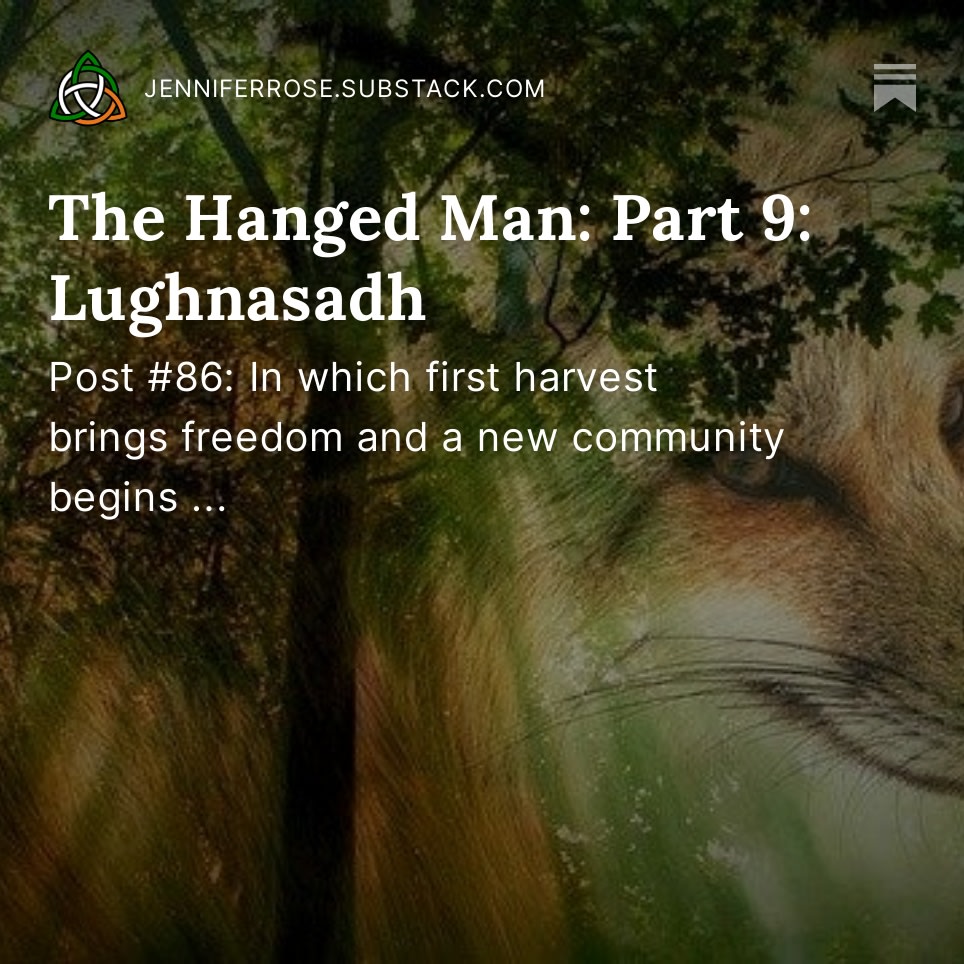
by Jenny Rose | Aug 26, 2023 | A Flourishing Woman, The Journey
Two weeks ago my 87-year-old demented mother fell in her memory care unit and broke a hip for the second time in less than a year. Eight days later she died in a hospital under the care of Hospice, my brother at her side.
Until I sat down to write this, I was afraid I had lost my words, lost the need to write them, lost the ability to form them into meaning. But I haven’t. I’m still a writer. This remains. That’s a relief.
Oh, I’ve been writing. Lists. Notes. An obituary. Texts. Updates to family and friends. Daily journaling. But it hasn’t been creative writing. It hasn’t been this blog, or my fiction. These last two weeks have passed by, the first in a blur of pity and anguish, and the second in numb relief glazed with exhaustion, and I have not posted or published. I haven’t kept track of the days; they spill into one another, as the days and nights blended together while my mother lay dying and we waited.
For a time words have simply been inadequate to relieve the pressure of my feelings in any organized or coherent way. They flew away from me, leaving a series of kaleidoscopic impressions, sensual details so vivid they frightened me with their power.
While my mother lay dying I reread my childhood copy of The Wind in the Willows by Kenneth Graham. Reading has also largely failed to sustain me during this time. I find myself unable to focus. I read a paragraph or two, and then realize I’ve been sitting staring into space, out the window or into the garden, not hearing, not seeing, not even thinking. Just sitting. But I needed a companion for the night watches, something comforting and familiar. Something innocent.

Photo by Josh Applegate on Unsplash
The fan in my window purred during those hours, blowing in cool night air and an occasional moth or mosquito. Every night, when I go to bed, I light a tea light in a candle lantern. When calls or texts reached me, I knew when I opened my eyes if it was before midnight or after, according to whether the candle still burned. Propped up on pillows, glasses on, my small bedside lamp alight, I spoke to Mom’s facility staff, emergency department doctors and nurses. I texted with my family. I read, the well-remembered illustrations making me smile as I communed with Rat, Mole, Badger, and the ridiculous Toad, finding respite for a few minutes before turning off the light and lying awake in the dark room, listening to the fan, feeling my heart beat, resting, breathing, waiting.
While my mother lay dying and after, I’ve stained wooden pallets. My partner and I are building a 3-bin compost system against the back yard fence. We set out sawhorses. I found an old brush, a rag, a stirring stick. We bought stain. I lay a pallet on the sawhorses, brush away dirt and debris, and paint every surface. The raw wood soaks in the oil-based stain, a rich brown color. The brush is more and more frazzled. I’m sloppier than I would be if painting a wall. The pallets are splintery. Some of the boards are split or loose. I bend over, the sun hot on the back of my neck and my bare arms. Mosquitos bite me. Stain drips between the boards as I brush their edges, dappling the sawhorses, falling onto the filthy old cream-colored jeans I’ve been wearing all summer in the garden, and onto my worn-out sneakers, used only for outdoor work now. As I maneuver between the boards, stain smears the skin of my hands and wrists. I kept the phone close, in a patch of shade.
This is the only sustained work I’ve been able to do. Now and then I wash a few dishes. I’ve done a couple loads of laundry. I go out into the garden, note the trimming, pruning, composting, mowing waiting to be done, and turn away. It all feels like too much. I don’t know where to start. It’s impossible to open the garden shed, get the tools, wheel out the wheelbarrow.
But the pallets. I can do that. It’s a simple task, direct. I don’t need to make any choices. Each side takes fifteen or twenty minutes. When I’ve finished a side, I wrap the brush in an old plastic bag, cover the can loosely, let the pallet dry an hour and a half in the sun. Then I turn it over and begin again. Two coats each side. One side after another.

Photo by Manuel Barroso Parejo on Unsplash
The smell of stain. The prickly feeling of intense sun on my skin. I think about compost, recycling, breaking down life to sustain new life. I think of ashes to ashes and dust to dust. I wonder if I’ll ever use the compost bins without thinking of Mom. I wonder who names the colors of stain and paint. I chose ‘Canyon Brown’ for this project. I vaguely hear birds, cars passing by. Small groups of women walk by in clumps, hospital employees on their lunch break, talking about families, gardens, school starting, hospital gossip. I should be at work, on that same campus, just a ten-minute walk away. I should be, but I’m not. I’m here, staining pallets, waiting for Mom to die and then on bereavement leave.
Am I bereaved? How would I know? I wonder why I don’t care enough to follow the thought. I let it drift away.
I decide I want to make bread. I don’t eat bread often, so rarely make it any more. But my rosemary is bushy and ready to be harvested, and someone brought fresh home-grown garlic into work to share before … before all this. So I make a sponge, stirring together milk, a little sugar, yeast, water. I chop fresh rosemary and garlic, very fine. I take flour out of the freezer and let it warm. The dough is heavy under my hands, sticky at first and gradually becoming supple and smooth. The earthy smells of garlic and rosemary vanquish the smell of stain in my nostrils. I turn the dough, kneading. The timer ticks off seconds and minutes. I clean the bowl, grease it, use a linen towel to cover it for rising. I put it in the oven for safe keeping, because the cats are likely to lie on it or step in it, or nibble at it if I leave it out. The bread, like the pallets, is a project in stages. I don’t have to focus on any one step for more than a few minutes. I move between the kitchen and the back yard with my phone, not thinking, not planning, just taking the next step, and the next. I can’t remember times, so I write them down. About 90 minutes for the stain to dry. An hour for the bread to rise. Another 90 minutes for the pallet to dry. Another hour for the shaped loaves to rise. Another 90 minutes. An hour for baking.
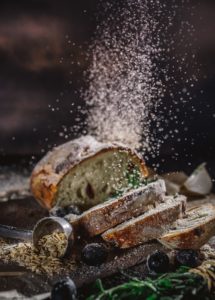
Photo by Helena Yankovska on Unsplash
At the end of the day, I have two enormous round loaves of bread to cool, slice, and put in the freezer. This batch will last me for a year. I have finished another pallet. I leave it on the sawhorses to dry overnight. My stained hands smell like garlic.
I haven’t cried since the last night call, my brother telling me Mom was gone. Perhaps I cried all my tears before she went. I receive condolences with all the grace I can muster. People talk to me about God and heaven. They talk to me about Mom. They talk to me about their own experiences of death. I try to be gracious. I try to look like I’m listening, like I’m there. With my brother and sons, my partner, I can be real. The faces of my friends comfort me. They don’t need anything from me. They don’t ask for anything. I can see their concern, their love for me, their sorrow. They hug me, and smile. They talk to me about small things, the daily things I’ve lost track of – family, friends, outings, work. I pick up a friend’s daughter and feel almost normal, doing an ordinary thing, a manageable task I cannot fail.
I realize part of my feeling of unreality is rooted in a loss of identity. I catch sight of myself in the bathroom mirror and pause. I rarely look at myself in the mirror. This woman, who is she? She isn’t the disappointing daughter any more. She can’t be, if there’s no mother to disappoint. What else is she? Who else is she? I look into my own eyes and feel no shame, no guilt. Did Mom take them with her? How will I navigate my life without them on my shoulders, without the knowledge that Mom is alone, suffering, needing? For fifty years I was at her side, day and night, year after year, ineffectual, helpless to fix or heal her physical pain, her dysfunction. Feeling my failure, my powerlessness, knowing I more often made it worse than better as time went on, even though she clung closer and closer to me as she aged. She could not release me and I almost waited too long to release myself.
But the geographical distance I put between us brought no real release. She still suffered. She declined, grew confused. Her body aged and began to run down. She was just as lonely without me as she was with me, just as emotionally remote, just as relentlessly needy. She cut herself off from me, but I still carried her. Internally, I still orbited around her. I still agonized for her.
I still loved her. I always loved her. I accepted she could not find me lovable, but it made no difference. She was my mother, and I loved her. All I ever wanted was for her to be well, and happy, but I could not make it so, and in her eyes it was my responsibility to fill her need. Indeed, she told me long ago her physical pain started with her pregnancy with me. I accepted the blame, and was heartbroken, and have tried desperately to make up for it ever since.

Photo by Nicole Mason on Unsplash
Now Death has come to stop her suffering. Has mine stopped, too? I don’t know. I’m too numb to tell. But I feel different. I feel … released. I prayed for her release and freedom, not mine, but perhaps they were linked. Many times a day I think of her, hear her voice in my head, and I realize with a painful clench of my heart she’s gone. It’s over. I can’t humiliate her anymore because of what I wear, how my hair looks, what I do, who I sleep with, or, most of all, what I write. She’s moved beyond humiliation. I can’t fail her anymore. And that’s a soaring, joyful, unbelievable thought. I can’t fail her anymore.
I wonder if I’ll finally feel good enough, if I’ll do a good enough job, live a good enough life. Might I simply enjoy my small talents, my joyful work, my community, my garden? Might I immerse myself in the loveliness of life without the gnawing guilt of knowing I’m happy when she’s not, I’m companioned when she’s not, I’m relaxed and rested and peaceful when she’s not, I’m laughing when she’s not?
The last couple of times I spoke to Mom, I told her it was okay to rest now, she could let go, be at peace. We told her her loved ones and animals were well and happy, and she could relax.
I told her, and I meant it. Was I telling myself, too?
She could not release me, yet I am released. Did Death break the chains when he gathered her in? Or now, at last, have I released myself, now that she’s moved entirely out of my power and knowledge?
As I write this, it’s Wednesday afternoon. I have finished another pallet. I have written. I have sat in the sun, read a paragraph or two at a time of an old Edna Ferber novel, rested my eyes on the garden. The lily stems are turning dry and brown, as are the leaves. Sunflowers bloom. The sun is hot. The phone has been sitting on my kitchen table all morning, silent, as I go in and out. I have balanced my checking account, scheduled a private swim lesson in a home pool, ironed a tablecloth and three napkins. Tomorrow I go back to work.
A new page of my life has turned. I can’t read it yet. It’s enough to sit with it in my lap, letting my gaze wander over blue sky and afternoon clouds, the garden, our old cars, the worn wooden boards of the porch, the bruise on my left knee, the mosquito bites on my right arm, the smears of stain on my hands. It’s too bright in the sun to read this new page, too hot, too much effort. I’ll read it later.
I dare to be at peace.
Daughter’s Dream (July 2014)
I dreamt I carried my mother.
The car had slipped out of her control
with a blind will of its own,
and I thought
I knew she shouldn’t be driving.
We landed in water.
I swam to her and held her in my arms.
Then the water was gone.
I carried my mother,
but she left my embrace,
slipping free of her embattled flesh.
Irrevocably, I felt her go.
I was alone.
I carried the vacant body of my mother.
Empty beds stood all around me
but the sheets were disordered and dank,
Smeared with shit.
I carried the vacant body of my mother.
There was no clean place to lay her down.
I carried the vacant body of my mother,
seeking to slip into my own freedom,
seeking absolution.
To read my fiction, serially published free every week, go here: 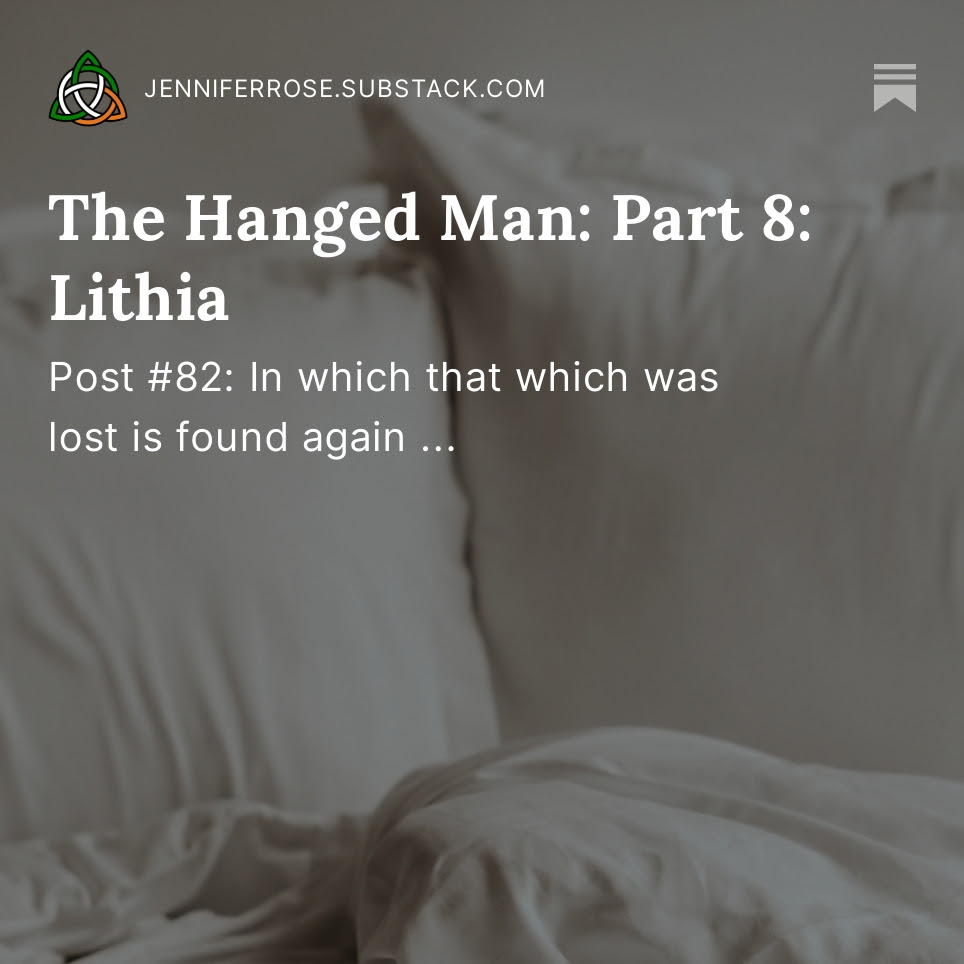
by Jenny Rose | Apr 29, 2023 | A Flourishing Woman, The Journey
I have returned from ten days in Colorado during which my brother and I prepared for and hosted a living estate sale. Together, we emptied, polished and cleaned my mother’s house. Thankfully, she herself was oblivious, as she is in memory care with a hospice team supporting her.

Photo by Michal Balog on Unsplash
We were successful in our goals, which were to spend time with Mom, hold the sale, and ready the house for renters, who are moving in as I write this.
It doesn’t feel like success, though. Since I arrived back home to Maine, I’ve been groping for what it does feel like, but I couldn’t come up with a clear answer until this morning.
It feels like loss. It feels like a hundred small losses.
Until I came to Maine, Mom and I lived in a small town at the foot of the Spanish Peaks in Southern Colorado. The town lies in a green (sometimes) valley nestled below the Trinchera Mountain Range and the peaks, and something about its geography brings harsh, dry winds that scour the landscape for days, filling the dry air with bits of desiccated landscape. The wind is relentless, without mercy, inescapable.
It was windy for the first several days we were there, and I feel as though I have been staked in the teeth of that wind, like a plastic bag caught on a barbed wire fence, whipped and shredded into ribbons.
I hadn’t realized before that cleaning out an old person’s house is never about just that person. Mom, as the oldest remaining family member, kept papers and pictures regarding known and unknown ancestors, fragments of hidden family stories. She had her mother’s antique armoire, filled with crystal stemware, silver, and china with gold accents. Cupboards and drawers housed ornaments, cut-glass dishes, and jewelry that belonged to my maternal grandmother. Cross stitch, embroidery, and needlepoint done by that same grandmother and my younger self hung on walls throughout the house. She held onto papers and records from my adopted father, deceased for many years. Mom still had his good parka and a pair of his almost unworn boots in her coat closet.
We recycled and shredded pounds of paper, filled and tied countless bags of trash. I packed boxes and baskets and plastic storage containers with bathroom products, cleaning products, dishes, silver, kitchen stuff. I put inexpensive jewelry on a tarnished silver tray for the sale. We used up all the old newspaper for wrapping and I put out an SOS for more, which speedily arrived. I packed boxes to ship home to myself of the few mementos I wanted and took them to the post office, one by one.
All these bits and pieces of lives, of family. A collection of nail clippers and tweezers, from rusty and stiff to new. Hundreds of greeting cards for every occasion. Old letters, report cards, school papers. Boxes and albums full of photos.
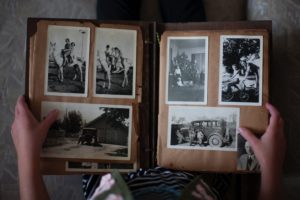
Photo by Laura Fuhrman on Unsplash
In the laundry room, I sorted through products for cleaning, polishing, waxing, staining. I found three open bottles of lemon oil for wood, sticky and congealed. I discarded old sponges, rags, scrub brushes and a broken Swiffer.
I moved Mom into that house. I painted the front and garage doors. I painted the trim around the new windows. I painted the walls in the sun room and hallway.
I felt engulfed by the past, a past I prefer not to dwell on, a past I would like to let rest in peace.
But the wind caught me, pinned me against the thorns and spines of the high desert, and had its way with me.
Is home the place that glues us together? Perhaps. Perhaps that’s why I feel unglued, fragmented, as though I have left pieces of myself in my wake for the last couple of weeks. I inadvertently left a book I was reading on a bench while waiting to meet my brother at Denver International Airport the night I arrived. It was a good book, too. Part of me still sits on that uncomfortable bench, reading, watching reunions, waiting out the slow minutes until the tall form of my brother rises into view on the escalator.
We found pieces of ourselves in that house, my brother and I. I wondered if I looked as lined and shadowed as he did. I wondered if I looked as frayed and torn as I felt. My mother’s fleshless face, fragile skin, and bewildered eyes clawed at my heart.
Part of me is on each of the two planes that carried me across the country, wedged in among strangers, my bag between my feet, my backpack between my knees, while I read and dozed and tried not to think about how uncomfortable I was, tucking my elbows in tightly so as not to intrude upon my neighbors.
Part of me sits at various disheveled, grubby, airport café tables, anonymous, utilitarian, with the hard-used look of all airport eating establishments where the high-priced food tastes of weary miles.
I cried in the shower at Mom’s house, letting the water wash my tears, my hair, my skin cells down the drain and into the wastewater system of my old town.
I found pieces of myself in the faces of my friends, in an outdoor hot tub at dawn with a dear one, in a dance with some of my old dance group, all the more poignant because of the absence of others. I filled my eyes with the majestic Spanish Peaks, looming over the valley. They anchored my life for years.
I found pieces of myself, too, on the dusty interstate highway I traveled hundreds of times during my years in that place. The pronghorn antelope, the giant wind turbines, the miles of yucca, cholla cactus and tumbleweed. The familiar place names and exits. Surely some part of me will eternally drive north and then south along those miles, some ghost, some echo.
Part of me is still standing in the 6:00 a.m. hour-long line for TSA at Denver International, shuffling forward a few feet at a time, surrounded by hundreds of other people, early-morning faces creased, crumpled, yawning, and resigned. Mothers with children. Families. Couples. Young people. Old people. Businesspeople.

By David Edkins on Unsplash
I deliberately left a book on the bus that brought me from Boston Logan Airport to Augusta, Maine. I was finished with it and I didn’t want to carry it any more. Perhaps it will be a happy find for some other traveler who will sit where I did, taking their own journey, and their hands will turn the pages I touched, their eyes travel down the printed lines.
I said hello, and then I said good-bye again, not knowing if it was a final good-bye. Hello and good-bye to the memory of the good man who was my adopted father. Hello and good-bye to my mother’s parents and their parents and theirs. Hello and good-bye to my brother. Hello and good-bye to my oldest son, now living in Denver. Hello and good-bye to my friends, to Mom’s friends, to the dusty dirt roads, to the two houses I lived in during my years in that town, to my memories, to the community, the places I shopped, the places I ate, the places I danced and worked and told stories and hiked.
Hello and good-bye to Mom and the caregivers I met and conferenced with.
So many good-byes. Too many good-byes.
And then hello. Hello to my partner. Hello to the initially disbelieving cats, who still zoom around in excitement and welcome days later. Hello to my comfortable bed, my serene room, my kitchen, my giant-sized tea mug, my laptop, my little bathroom, my electric toothbrush.
Yesterday I went out to sit on the porch and read. It was beautiful in the sun; the garden full of exuberant new life. I put my book down and weeded, discovered bulbs coming up, and planted peony roots. Those hours were the first feeling of coming home to myself.
I’ve come home to the simple rhythm of swimming, to the warm, humid, familiar routine of my job in a rehab pool facility. I’ve come home to the keyboard and the page.
I went to the store this morning. I had a list. I drifted up and down the aisles, putting a few things in the cart. I set a book I was finished with on the donation table. It was as though I walked through the little mom-and-pop store in my old place in Colorado and the Safeway in a nearby larger town at the same time. I felt confused. I walked in a dream. I forgot where things were. I couldn’t focus. I left with a small bag of groceries I didn’t feel like I really needed or could use. I came home, made a cup of chai, and used up the milk. I knew I needed more and remembered while I was shopping, but I didn’t buy any …
Too soon to shop. Too soon. I’m not all here yet. The pieces I left behind are still caught in the wind of my passing. I feel as threadbare as Mom’s memory. I wonder if all those pieces will find me again or if the wind has carried them away forever. Do I want all the pieces? Did they slough away because I no longer need them? I can’t tell. I don’t know.
Two things are clear to me. The first is something I read and wrote about somewhere on this blog. The greatest thing we can do to honor those who came before us is to live our lives fully. Grieving fully does not mean living in grief forever. Living fully means living now, not in the past. Living now cannot be accomplished with clutching hands and a clenched heart. Now is not then, nor is it a future that never arrives. Now is now: the sleeping cats, the creamy pink flowers on the magnolia outside the window, the sound of the birds at the feeders, sunlight on the neighbor’s house.
The second is that none of us can live in two places. I transplanted myself to Maine years ago, and have no regrets. My roots are watered here. I belong here. It’s my place now. We need each other. For this day, I will choose to believe all the pieces of myself I need will find me again, will gradually come home to me. The rest I will simply let go, as I’ve let so many things go during the last days and years.
Questions:
- Have you ever been responsible for sorting through a loved one’s possessions and wrapping up their life? What was the hardest part for you?
- What’s the best support you’ve received during a process like this?
- How have you supported others who have needed to manage a loved one’s estate?
- Have you ever felt so emotionally exhausted you couldn’t function? What helped?
Leave a comment below!
To read my fiction, serially published free every week, go here: 
by Jenny Rose | Apr 8, 2023 | A Flourishing Woman, The Journey
Delayed closure is a wound treatment strategy in which complex wounds with extensive soft tissue damage and high levels of possible contaminants are treated with initial control of bleeding, cleaning, and debridement, and then left open for a period of time during which the possibility of infection is treated proactively. At the time of delayed wound closure, further debridement of scar tissue or dead tissue takes place.
As I count down the days and prepare for my second trip out to Colorado this year to manage my mother’s recent admission to memory and hospice care, the phrase ‘delayed closure’ reverberates through my mind.

Photo by Ryan Moreno on Unsplash
Delayed closure.
I have recognized for some weeks the significance of this second return to the place I called home for more than 20 years and my frail, confused, aging mother. At least, I have begun to recognize the significance. Every day brings added clarity. Awe is not too strong a word for what I feel.
When we flee people, places, or situations (and my flight from Colorado to Maine eight years ago was all three), it’s not an elegant, dignified process. It’s a frantic life-or-death flailing and thrashing, a single-minded determination to survive, whatever it takes.
The process leaves wreckage behind, a lot of unfinished business, a lot of rending and tearing, misunderstanding and hurt. It leaves, in other words, a complex psychic wound, not a clean laceration.
When I found myself in Maine, I thought I would not survive the trauma. I had torn myself up by the roots and gone to ground in a strange place I’d never been before. I felt like skin and hair wrapped around a suppurating wound of such longstanding duration and composed of so many different kinds of damage it didn’t seem possible it would ever heal. I didn’t think of healing. I didn’t hope for healing. I was a feral creature in survival mode.
I had no idea I had in fact saved my own life and taken the first steps to transformation, and I wouldn’t have cared if I’d known.
All I was doing was surviving.
In medical care, part of the strategy of delayed wound closure is giving the body’s natural defenses a chance to overcome infectious bacteria rather than sealing them in.
What were my natural defenses?
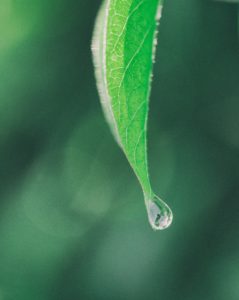
Photo by Aaron Burden on Unsplash
Water. My home in Colorado had been enduring a years-long drought. The wind blew all the time. Gaunt, dusty cattle stood sunken-eyed on plots of hard-baked ground. The wind blew relentlessly, scouring the land with flying sand, dust, and debris. We prayed for rain as we hauled grey water to our gardens. The city imposed restrictions on outside watering, car washing, any outside fires. Trees died. Fires consumed the land. It was apocalyptic, a hellscape with no relief in sight. Our water bills went up and up for simple household use. The rain didn’t come, year after year.
Maine was a revelation. Water. Big water, like I’d never seen before. The Kennebec River. Puddles everywhere, each with a duck. The people here call an enormous lake (to my eyes) a pond. Huge trees. Hip-high ferns. Moss.
Moss!
Rain. It rained. It actually rained. Measurable rain falling for hours, sweet, cool, life-giving. Mist. Fog. To breathe was to absorb water like a desiccated sponge. My cracked skin healed, drinking in the moisture. I lived in a house with a hand-dug well. No water bill. Free water! I trained myself to flush the toilet every time! My hair curled, growing out rather than down.
I lived in the country in Maine. No one knew me. No one knew I existed or any member of my family. For the first time in my life I escaped everyone’s expectations. No one demanded anything from me. No one watched me with critical eyes. No one told stories about me. I had no reputation. I was free, untethered from everyone and everything. I could think my thoughts and feel my feelings in safety and privacy. I could read, or work, or sleep, or take a walk, or garden without interruption or someone telling me I was failing. No one demanded anything from me. I had no emotional labor to do. I rested in the healing solitude of nature, laying my hands on trees, sitting on rocks watching little spring streams trickle, sitting in the sun listening to the birds, lying in bed listening to the owls, coyotes, and spring peepers in the pond.
Writing. In 2016, a year after I arrived, I began this blog. I had no expectations. My sole intent was to write my truths in my own uncensored voice without trying to please anyone, in spite of my fear. I had done some writing in Colorado, but always with a sense of guilt and shame, always with the fear of what others would think. I knew everything I wanted to write would be looked upon as unforgiveable betrayal or wildly shameful.

Photo by Angelina Litvin on Unsplash
In Maine, so far away in a new life, I discovered my courage and started, week by week, recording my journey from a broken, cringing creature, filled with self-loathing, to a strong, confident woman. At the same time, I pulled together my scrawled notes and the stories I’d written in the dim, hidden edges of my life and finished a book. Then I started another one. Then I finished the second book and started a third one.
These were my natural defenses: water, nature, and writing. Slowly they overcame the infection in my ravaged soul.
Yet the wound did not close. It stopped stinking and bleeding. Scar tissue formed. But I had lost too much to pull the edges together and make a neat closure. I had saved my life. I had survived and gone on to thrive. But I knew I was not done.
I know an old story about amends; it says only the hand that dealt the wound can heal it. Sometimes we must flee in order to live to fight another day. I fled, and I was right to do so, but flight leaves no time for closure. For closure sometimes we must go back.
Delayed closure.
The first time, in January, I was afraid to return. Afraid of judgement. Afraid of old pain. Afraid of what others would think, or say. I was afraid to have my memories stirred up. I was afraid my wound would tear open again, and this time I would not survive.
What happened instead was acceptance and love in the arms of old friends. My love for them was met by their love for me. The place, dear and familiar, welcomed me, though I no longer call it home. I found changes, of course, but not painful changes. Natural changes. I realized my fear had kept me from the closure I need, and my fear, once faced, amounted to nothing. In reclaiming my power, I was able to gain perspective. I’m just a part of that little town in the way it’s a part of me. I’m not the most important part of it and never was. It’s not the most important part of me and never was.
Having reclaimed my power, I felt and expressed my honest love and affection for the place and the people without needing anything in return, although I received much in return with gratitude and, I hope, grace. I examined the wound again, debriding scar tissue, cutting away necrosis, until my soul was healthy and vital once more. Some lines. A few silver scars. But free of infection, free of pain.
Still, when I came home to Maine again, I knew I was still not finished. Closure was not complete. I knew one day I would return once more to the place I had left.
In less than a week I’ll be there again, this time for a longer period. We must prepare for and hold a living estate sale: clean, sort, sell, discard, donate, and perhaps store a house full of, not my mother’s life, but her stuff. The things from which she constructed her identity. We must see to repairs and the business of welcoming renters in.
We will also visit my mother in memory care. If she’s well enough, we’ll take her out for a meal or a little gentle shopping. Perhaps we can sit in the sun with her. Or, perhaps she’ll be angry and bitter, refuse to sit in her wheelchair, demand to go buy a car, or some other wildly inappropriate and impossible thing.
I will see her again, though, speak to her, tell her I love her. I’ll check to be sure she has everything she needs. I’ll speak to the staff, to her hospice team. I’ll buy some books for her from the Friends of the Library bookstore she herself created and helped run for years. If she can’t go out, we’ll bring food in, perhaps a flower in a vase, and sit in the dining room where other residents can see her with her family, give her the dignity of being loved and cared for rather than forgotten and discarded.
It will be hard, or it will be easy, or it will be both. Dementia is like that. However it is, though, I won’t take anything to heart. Her power to hurt me has unraveled, along with her memory and cognition. She’s physically safe at last. Her physical and emotional wellbeing are no longer my responsibility. They never were, of course, but I didn’t believe that until recently.

Photo by Jeremy Bishop on Unsplash
I’m free. Free of my painful memories, free of old stories and narratives, free of the fear of what people will think of me. Free of fear, most of all. Freedom fills in that old wound and now, at last, I can pull the edges together, stitch them with words, with love, with wisdom, with forgiveness of her and myself. I have traveled a long, long road through darkness, despair, self-hatred, and trauma, but I still love. I still care. I still dance, and laugh, and write, and thrive. I still belong to Life.
I did the very best I could every step of that journey. I was blessed with guidance and friends and teachers. My wounds were not mortal.
Now, journey’s end. Delayed closure. New beginnings.
Questions:
- What is your experience of going to a place you called home after a long absence?
- What open wounds do you still have?
- How have you closed longstanding wounds?
- Do you see a living estate sale as a cruel betrayal or an appropriate business choice?
Leave a comment below!
To read my fiction, serially published free every week, go here: 
by Jenny Rose | Mar 25, 2023 | A Flourishing Woman, The Journey
We moved into this house a little less than a year ago.

New Home, May 2022
The chaos of the transition gradually ebbed away, leaving me beached with all my things and a sometimes fearful, sometimes eager curiosity about what this new chapter of my life would bring. This move, for me, was not random, but intentional. I felt it as an important step in my journey to an unknown destination. At this point in my life I’m not much interested in destination; my fascinated gaze rests on my inner and outer landscapes as the days come and go. I travel in the direction of freedom, space, and simplicity.
These last months I have spent time sitting in various places in my space dreaming, imagining, listening to the whispers of this old house, audibly exploring the surge of the neighborhood outside my windows and walls. I have watched the garden leaf out and bloom, then wither and die. I’ve learned the slant of the sunlight coming through the tall windows. From the chaise where I sit writing this morning I can see a patch of eastern sky through the bare branches of a neighbor’s tree outside the kitchen window; from here I watch the dawn come during my early morning journal time.
We have updated the electrical system. We have updated the plumbing. We have invested in a hybrid hot water heater, shaving our electrical costs. We have bought and installed a sump pump in our wet cellar. I have brought home innumerable paint chip samples, pinned them to walls and woodwork in every room, watching them glow and dim as hours and seasons pass across them.
I have refrained from adding anything to my space, filling it instead with a mist of dreams and imagination. Indeed, I subtract objects as I clean and scrub and mop the scarred, stained, pine floor. I’ve lived with the gouged trim, the slapdash paint, decades of nails, rusting staples, and screws in the plaster walls which, when pulled, leave large, crumbling holes.
When I first saw the house, in pictures on a real estate site online, my bedroom was being used as a dining room. It remained a dining room the first time we were here, New Year’s Eve 2021. Our attention was drawn to the exposed original tin ceiling in the living room next to it; we were told the same ceiling was above a newer suspended ceiling in the adjoining kitchen.
In the then-dining room, now my bedroom, another suspended ceiling was installed, the kind with a metal grid supporting ceiling panels seen in office spaces. Some of the panels were painted in lavender curlicues.
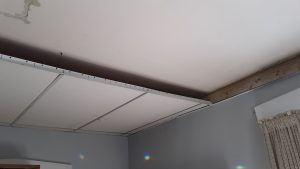
Bedroom ceiling 03/23
It was laughably hideous. I laid in bed and looked up at the ceiling, wondering what was above the curlicues. Another tin ceiling? Plaster? The naked underside of the floor above? One day I would find out.
That day was a couple of weeks ago. One morning my partner and I took the tall steps into my room and pushed up one of the panels, revealing an old plaster ceiling that had been wallpapered and then painted. We could see ancient water staining and cracks.
Once I knew, I couldn’t wait to get the suspended ceiling down. I gathered tools and ragged sheets to throw over my furniture and went to work.
Some of these old houses have plaster made with asbestos. Wallpaper and glue contained arsenic to discourage rats. Older paint often contained lead. As I worked, I uncovered at least two layers of wallpaper and three of paint. I opened a window for ventilation and, wincing, pulled nails and screws out of the plaster, which created the most damage. I used a putty knife to peel up the curling loose edges of wallpaper and flaked paint, leaving what is firmly adhered in place. I worked for a couple of hours, absolutely happy. It took another hour to clean up the mess and get the debris into the dumpster.
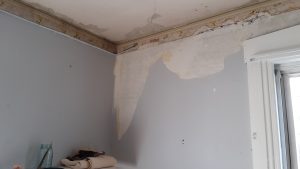
Bedroom 03/23
I’ve taken out two thirds of the suspended ceiling now. The room remembers its former elegant lines. In some places the plaster walls are stripped naked. As I lie in bed, I wonder what this room has contained. How have others who lived here used this space? Who chose the first layer of wallpaper, and the second? Whose hands glued, papered, painted? Who put in this screw and that nail, and why?
Some might find the room austere, bleak. I don’t have much in it right now, because it’s just more to cover, move, and clean as I go. I have a single bed, small but as luxurious as I can make it. The high ceiling soars above the ragged walls like a cloudy autumn sky soars above tattered trees.
All my life something in me has rejoiced in bareness, in spareness. The space between and around objects means more to me than objects themselves. Color, light, air, and music, ever-changing, pure, without form, sustain me more than things.
In this bedroom, in this house, I’m conscious for the first time in my life of a longing for expansion, not to contain more things, but to contain more life, more being. I’m awed by my own freedom, my release from so many burdens I carried in earlier years.
Peeling away flaking wallpaper, brushing away crumbling plaster, I feel like a sculptor. Gentle-handed, I pry and pull. I’ll fill holes, patch, spread joint compound. It will take time. It will make messes. Plaster dust will float out my open windows. One day walls and ceiling will be ready for new coverings of color and texture. I’ll throw sheets over piled furniture, work, clean, move it all back, one wall at a time. I’ll replace the two tall, elegant windows. I’ll glue up faux tin ceiling tiles, honoring the house’s colonial period and aesthetic. The days and hours will pass. Light will move across the walls and ceiling. I’ll open the curtains in the morning and close them at night. I’ll eat and sleep, work and write, swim and walk while the seasons turn around me.
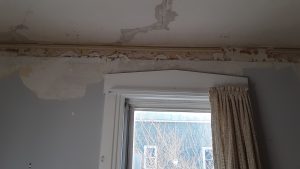
Bedroom 03/23
As I stroke the house, uncovering, reducing, baring, and finally reclothing its lines, my own skin loosens, cell by cell. My eyebrows and lashes diminish. My skin thins and dries, stained by sunshine, silver-rippled by the full moon of long-ago pregnancy. My flesh softens.
Neither the house nor I will again be firm-fleshed, new, perfect. Repaired plaster has a variable, subtle landscape. I have lived in my body for nearly 60 years. Life shapes us and makes us its own. Many lives have had their being within these walls, but I am comfortable with their ghosts.
I think of my own ghosts, too, as I work. Life and time have molded the house and me. The ghosts we call memories stay within us, haunting or blessing, as the case may be. As I chip away at painted-over screws and staples, remove panels and pull away pieces of metal grid, I release the house from the past as I release my own excrescences, recognize and mitigate my own toxic layers of what others expected and how they defined me.
I did not know how captive I was until I found myself free.
Questions:
- What has held you captive in your life?
- Do you find more joy in stripping down (subtracting) or layering on (adding)?
- Are you more likely to repair flaws or cover them cosmetically?
- Are you distressed by “imperfections” in your environment and/or your body and cover or hide them, or do you honor them?
Leave a comment below!
To read my fiction, serially published free every week, go here: 